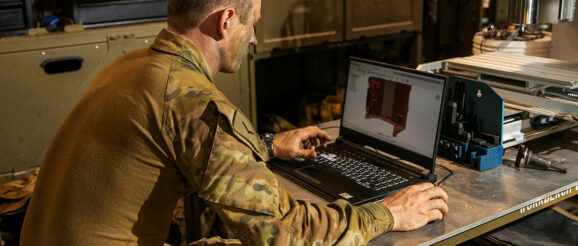Bolstering defence innovation in Australia’s north | The Strategist

The story of Darwin really begins with the necessity to establish a support route for the Overland Telegraph to the southern states of Australia. In November 1871, the 1,100-mile submarine cable between Darwin and Banjoewangie in Java was laid. This in turn was connected through Singapore to Europe and London.
It was one of the greatest Australian engineering achievements you’ve probably never heard of. The cable connected Australia to the rest of the world, with the first official international telegraph dispatched from Darwin on 22 August 1872. But it didn’t come easily.
The harsh environment and Darwin’s geographic isolation required an innovative approach that accounted for local conditions and utilised the expertise and wisdom of the area’s First Nations people. The final route chosen for the overland cable was a traditional trade route that Indigenous people had used for thousands of years.
Yet the Northern Territory is probably not the first place that people would think of when it comes to technology development and innovation, especially in the high-tech world of defence. Other Australian states have long been working to establish themselves as leaders in defence innovation—and succeeding. While each jurisdiction has its own unique priorities and strengths, the federal government’s focus for these initiatives has primarily been ‘south of 26 degrees south’ and funding has reflected that.
The South Australian government has been actively promoting the state as a hub for defence innovation, with a particular focus on advanced manufacturing and high-tech industries.
Victoria has established a Defence Science Institute to support collaboration between universities and industry partners in defence innovation, with a focus on areas such as cybersecurity and autonomous systems.
New South Wales has focused on developing advanced manufacturing capabilities and supporting research and development, and similar initiatives have been undertaken in Queensland and Western Australia.
But what about the Northern Territory?
Most in the defence organisation tend to think of the NT only as a stopover for Australian Defence Force deployments into the region—which it is, as a forward operating base—and a place to conduct training and exercising in the dry season. Few would consider it a natural home for innovative defence technology development.
But the NT government—a small jurisdiction both population- and budget-wise—has been working to change that perception over the past few years and has self-funded and supported some truly innovative projects.
Unfortunately, this work has been done on a shoestring budget and with limited support from the federal government or industry. Two examples are Australia’s only defence and aerospace Industry 4.0 TestLab at Charles Darwin University and the ‘virtual twin’ project for Darwin harbour and surrounds.
The TestLab is a partnership between CDU and RMIT University, with funding from the federal Department of Education and the NT government. It was launched in 2022 and has developed the new diploma of advanced manufacturing to assist territory manufacturers in transitioning to ‘Industry 4.0’.
Industry 4.0 is the full integration of cyber and physical production systems and has been heralded as the fourth industrial revolution. Cyber integration lowers costs and wastage while improving the competitiveness of businesses.
CDU is now running courses in which students learn how to manage Industry 4.0 projects, set up the internet of things on production lines, test cybersecurity technologies, and integrate 3D printing and robotics into manufacturing. These skills will all be critical for Australia’s future defence workforce.
The NT government’s virtual twin project is the first of its kind in Australia and incorporates data on geography, infrastructure, services and marine patterns to support and enable the ADF and allied forces to plan the construction of defence infrastructure supply chains across the territory. The virtual twin can also be used to simulate defence scenarios and to optimise planning, logistics, training and asset management programs.
The project was developed through a strategic partnership between the NY government, Secora, Dassault Systèmes and AMC Search. Delivered in just six weeks for only $2 million from the NT government—an industry first—the virtual twin will provide significant savings in both time and money for civil and military infrastructure projects.
The commander of US Indo-Pacific Command, Admiral John C. Aquilino, was briefed on the project and given a hands-on demonstration during a visit to Darwin in 2022. He was engaged and impressed and directed his planning staff to better understand how the US could use this capability, though nothing has come out of this yet.
The TestLab and virtual twin initiatives show that valuable defence innovation is possible in the Northern Territory.
The defence strategic review delivered plenty of funding to develop and strengthen critical infrastructure in the NT. It also contained plenty of rhetoric about the importance of the Top End.
Assistant Minister for Defence Matt Thistlethwaite said in a statement: ‘Defence bases and infrastructure in the north are essential enablers for Australia’s capability and major drivers of economic activity.’ Deputy Prime Minister Richard Marles has made similar statements, as have ministers of past governments.
Base development and hardening are essential. Increasing exercise tempo in the north is important. But Defence should not overlook the importance of an innovative industry base and workforce across the north to achieving its goals.
This will deepen Defence’s efforts and support Australia’s allies and partners who frequent the territory. It will also help to achieve the review’s goal for defence to be treated as a true whole-of-nation effort, which it notes will be sorely needed in coming decades.
